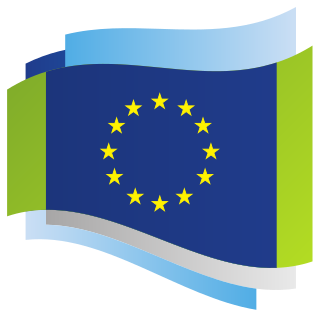Related Research Articles

The Lifelong Learning Programme 2007–2013 was the European Union programme for education and training.

The Directorate-General for European Civil Protection and Humanitarian Aid Operations, formerly known as the European Community Humanitarian Aid Office, is the European Commission's department for overseas humanitarian aid and for civil protection. It aims to save and preserve life, prevent and alleviate human suffering and safeguard the integrity and dignity of populations affected by natural disasters and man-made crises. Since September 2019, Janez Lenarčič is serving as Commissioner for Crisis Management in the Von der Leyen Commission.

The European Defence Agency (EDA) is an agency of the European Union (EU) that promotes and facilitates integration between member states within the EU's Common Security and Defence Policy (CSDP). The EDA is headed by the High Representative (HR/VP), and reports to the Council. The EDA was established on 12 July 2004 and is based in the Kortenberg building in Brussels, Belgium, along with a number of other CSDP bodies.

The MEDIA sub-programme of Creative Europe or simply Creative Europe MEDIA is designed to support the European film and audiovisual industries.

European Union culture policies aim to address and promote the cultural dimension of European integration through relevant legislation and government funding. These policies support the development of cultural activity, education or research conducted by private companies, NGO's and individual initiatives based in the EU working in the fields of cinema and audiovisual, publishing, music and crafts.

The Directorate-General for Communications Networks, Content and Technology is a Directorate-General of the European Commission and is responsible for EU investment in research, innovation and development of critical digital technologies.

The Directorate-General for Research and Innovation is a Directorate-General of the European Commission, located in Brussels, and responsible for the European Union's research and innovation policy and coordination of research and innovation activities. It is headed by Commissioner Mariya Gabriel and Director-General Jean-Eric Paquet.

The Directorate-General for Mobility and Transport is a Directorate-General of the European Commission responsible for transport within the European Union.
The Consumers, Health, Agriculture and Food Executive Agency (Chafea) was an executive agency of the European Union, set up by the European Commission to manage four programmes on its behalf, in the domains of health, consumer protection, food safety, and the promotion of European agricultural products. From April 2021 on, these programmes were reassigned to other agencies, most notably the newly created Health and Digital Executive Agency (HaDEA).
The Executive Agency for Small and Medium-sized Enterprises (EASME) is an Executive Agency of the European Commission. EASME was founded in 2003 as the Intelligent Energy Executive Agency (IEEA) and was renamed the European Agency for Competitiveness and Innovation (EACI) in 2007, finally becoming EASME in 2014. It is responsible for managing specific programmes in the fields of energy, the environment, and business support. Its goal is to promote sustainable development while improving the competitiveness of European industries. While the Agency has its own legal identity, it reports to several Directorates-General of the European Commission, which remain responsible for programming and evaluation of the programmes.

The Framework Programmes for Research and Technological Development, also called Framework Programmes or abbreviated FP1 to FP9, are funding programmes created by the European Union/European Commission to support and foster research in the European Research Area (ERA). Starting in 2014, the funding programmes were named Horizon.

The Directorate-General for International Partnerships is one of the departments of the European Commission. It operates under the authority of the European Commissioner for International Partnerships, Jutta Urpilainen.

The Directorate-General for Education, Youth, Sport and Culture is a Directorate-General of the European Commission.
The Competitiveness and Innovation Framework Programme (CIP) of the European Commission is meant to improve the competitiveness of European companies facing the challenges of globalization. The programme is mainly aimed at small and medium-sized enterprises (SMEs), which will receive support for innovation activities, better access to finance and business support services. It will run from 2007 to 2013.
Erasmus+ is the European Commission's Programme for education, training, youth, and sport for the period 2021-2027, succeeding the previous programme (2007-2014). As an integrated programme, Erasmus+ offers more opportunities for the mobility of learners and staff and cooperation across the education, training, and youth sectors and is easier to access than its predecessors, with simplified funding rules and a structure that aims to streamline the administration of the programme.

The Trans-European Transport Network Executive Agency was an executive agency established by the European Commission in October 2006 in order to realise the technical and financial implementation of the TEN-T programme. It ceased its activities on 31 December 2013 and was superseded by the Innovation and Networks Executive Agency (INEA).
The European Research Executive Agency (REA) is a funding body mandated by the European Commission to support the EU Research and Innovation policy. It has been established by the European Commission, based on Council Regulation (EC) No 58/2003.

The Directorate-General for Defence Industry and Space is a department of the European Commission.
The European Climate, Environment and Infrastructure Executive Agency (CINEA) is the European Commission agency which manages decarbonisation and sustainable growth. It is the successor organisation of the Innovation and Networks Executive Agency (INEA). Established on 15 February 2021, with a budget of €50 billion for the 2021-2027 period, it started work on 1 April 2021 in order to implement parts of certain EU programmes. The Agency will have a key role in supporting the European Green Deal, with a focus on creating synergies to support a sustainable, connected, and decarbonised Europe.